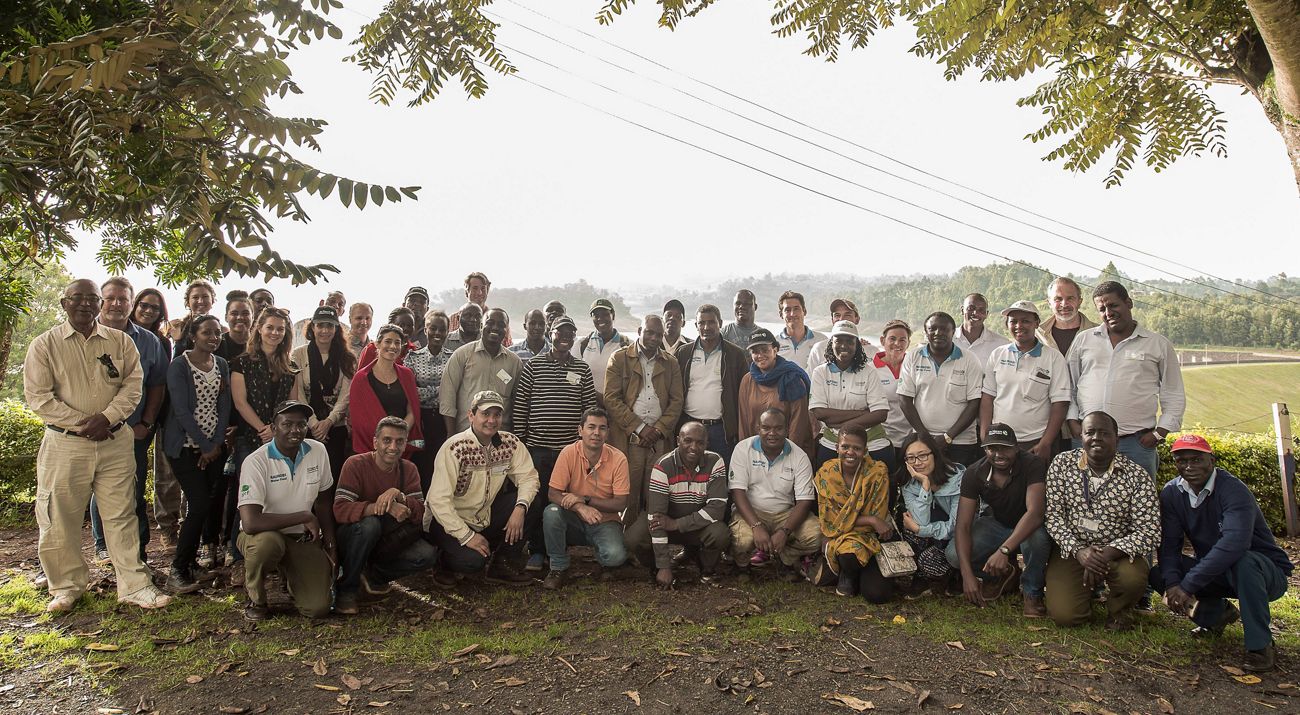Sharing Global Experience to Guide New Water Funds in Fast-Developing Africa
TNC training inaugurates network of potential funds aiming to secure reliable water resources for people and business as Africa’s population doubles and its economies boom.
City managers, utilities, and landscape authorities from across Africa gathered for a pioneering seminar on how best to replicate the global success of Water Funds to preserve precious water resources.
Water Funds raise finance from water users like businesses or cities that is invested to sustainably support people farming or living in watersheds and river basins to protect water supplies.
In early November, The Nature Conservancy convened groups from nine African countries representing nine different potential or emerging funds stretching from Morocco to South Africa.
They were joined by the team behind the Upper Tana-Nairobi Water Fund, the first operational in Africa, and specialists from the US and Latin America, where there are now more than 20 such funds underway.
The idea was to share the fruits of TNC’s two decades of experience helping to design and launch the 29 funds it supports worldwide.
“Water Funds are one of our more mature strategies, and what we’re trying to do here is an experiment,” said Daniel Shemie, TNC’s Strategy Director for Water Funds, who attended the training workshop in Nyeri in central Kenya.
“Can we build the capacity that TNC has, by democratizing the intellectual property that we’ve developed over 20 years and sharing that and equipping others with the same skills?
“It’s classic TNC: we’re convening, we’re providing the science and the direction, but ultimately we’re not trying to take the place of stakeholders, we’re trying to help them find the solution that works for them.”
Teams attended from fledgling Water Funds for the cities of Port Elizabeth, Durban, and Cape Town in South Africa; Dar es Salaam in Tanzania; Mombasa in Kenya; Kigali in Rwanda; and Addis Ababa in Ethiopia.
Others represented the Sebou River Basin in Morocco, and the Okavango Basin and Delta, which would be Africa’s first transboundary fund with authorities from Namibia, Angola, and Botswana.
There is a growing awareness across Africa that water resources need greater protection. The continent’s population is expected to double by 2050, and it hosts some of the fastest-growing economies in the world.
“At one of our plants in Addis Ababa already there is no water and we are trucking water in,” said Bezuneh Fole from PepsiCo’s Ethiopian franchise, who attended the workshop. “We can’t continue like this. We have to find an alternative.”
Zeleke Teferi, Head of Catchment Management for the Addis Ababa Water Agency, said what set TNC’s model apart was how it united farmers ‘upstream’ with water users ‘downstream’. “We have seen ideas like these Water Funds before, but until now there was always that disconnection,” he said.
Key sessions during the three-day training covered collecting the scientific data and financial modeling to underpin the business case for a new Water Fund, creating effective governance, and moving from theory to action plan to implementation.
Frederick Kihara, TNC’s Africa Water Funds Advisor, helped run the event with Colin Apse, Senior Freshwater Conservation Advisor, and Cory Zyla, Water Funds Program Manager.
“There’s no need for new cities to keep reinventing the wheel every time,” said Kihara, who plays a central role managing the Upper Tana-Nairobi Water Fund. “We have walked that path and we know the easy parts and the hard parts, and how to complete the challenge without stress. That’s what we are here to pass on.”
‘Trainees’ had completed a series of online training modules before arriving to the workshop. They were then matched with ‘mentors’ from existing funds or from TNC, who will be on call to advise as each new Fund progresses. Further gatherings are expected on an annual basis.
Those who attended said that they were encouraged by sharing their experiences, and by the opportunities offered by the new informal network of Water Funds that the training initiated.
Mediatrice Bana, Country Director in Rwanda for the Wildlife Conservation Society, which is exploring a Water Fund for the capital, Kigali, said: “Some of the challenges they have, I have too, and I’ve learned how they can be easy to address.”
Noel Ndeti is from Kenya’s Water Resource Authority, which is looking at a second Water Fund for the country in the coastal city of Mombasa. “We were lucky the training took place before our process begins,” he said. “We’re sure we’ll do the right things now, and use the information we’ve acquired and the connections we’ve made with people across Africa and Latin America.”
In South Africa’s Eastern Cape, Living Lands facilitates collaboration on environmental best practices among local stakeholders. Ancia Cornelius, its Landscape Mobilizer, said: “We are trying to figure out what are the real needs of the people in the landscape, and how to improve their sufficiency to ensure sustainability not just ecologically but socio-economically, too.
“This course helped me so much to see what are the baby small steps I’m going to take to get where we need to go, and where to start, and who to talk to. TNC has helped us so much how to organize ourselves to make progress.”
